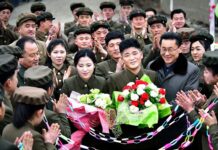There has been a thaw in North Korea-South Korea relations owing to diplomatic activity surrounding the Pyeongchang Olympic Games and the participation of North Korean athletes. However, North Korea unexpectedly cancelled a joint North-South cultural performance that was scheduled to be held at North Korea’s Mount Kumgang. In addition, the North has announced that it plans to host a large scale military parade just one day prior to the grand opening of the Olympic Games.
North Korea has also demanded that, “South Joseon [South Korea] stop war rehearsals with the American Imperialists [the US] forever.” North Korea uses this as justification for its pursuit of nuclear weapons. Some observers believe that the North is using the Olympics to further this argument.
Analysts are cautioning against overexpectations, even as the North sends athletes, artists, and supporters to the South to participate in events related to the Olympics. As the games draw to a close and the US-ROK military exercises kick back into gear, there is a chance that tensions will flare up again.

To learn more, Daily NK interviewed Konyang University Professor Kim Tae Woo (shown left), who heads the university’s Unification Research Center. “From the perspective of North Korea, the Olympics are the Olympics and nuclear power is nuclear power. It would be a miscalculation to believe that the peace offensive ushered in by the Olympics will result in denuclearization,” Professor Kim said.
Asked about where the strategy came from, Kim added, “Under analysis, it seems apparent that North Korea devised a secondary strategy to engage in dialogue and make peaceful gestures during the Second Plenary Meeting of the Workers’ Party Central Committee, held on October 7, 2017.” Put in other words, the strategy devised places top importance on maintaining the state’s nuclear program, and secondary importance on overcoming sanctions through self-reliance.
Professor Kim explained that the Olympic athletes have nothing to do with this top priority strategy. Rather, the cooling of tensions arising from the North-South diplomatic engagement surrounding the games is fundamentally aimed at trying to convince South Korea to ease sanctions, according to Professor Kim.
For this reason, Kim said that rather than looking closely at the North Korean Olympic participants, we need to be focused on preparing for the situation of the Korean peninsula after the games. He continued by explaining that three possible scenarios that might unfold after the Olympic Games come to a close.
In the first scenario, the North might indicate that it is willing to enter into a dialogue process that leads to denuclearization, as the South Korean government desires. Second, the North could enter into talks with the US for the purpose of being recognized as a nuclear weapons state. These talks would end when the North refuses to give up its weapons. Third, the North could continue nuclear and missile tests after the Olympics, and the US would consider a military response. In this scenario, the peninsula could return to crisis mode.
Asked to evaluate the likelihood of the scenarios, Kim believes it is extremely unlikely that the North will voluntarily give up its nuclear weapons. The second scenario is most likely, but it is also possible that the third could play out.
When discussing the likelihood of war on the peninsula, Kim said, “If a military confrontation between the US and North Korea occurs, then the North is likely to retaliate by striking the South.”
“North Korea has already provided the US with plenty of reasons to be upset. If you look at past history, the US tends to prioritize the elimination of threats to its national security.” Kim continued, adding that ‘a military option’ for North Korea is being discussed by the White House as a measure of last resort. It is therefore likely, according to him, that a North Korean provocation in the future will be met with a stronger reaction than we’ve seen in the past.
“Most South Koreans are thinking, ‘My goodness, is it really necessary to think about going to war?’ I think it is important to be ready for whatever comes after the Pyeongchang Olympics. This means that it is urgent to develop joint plans for any contingency, including conflict,” Kim concluded.




















